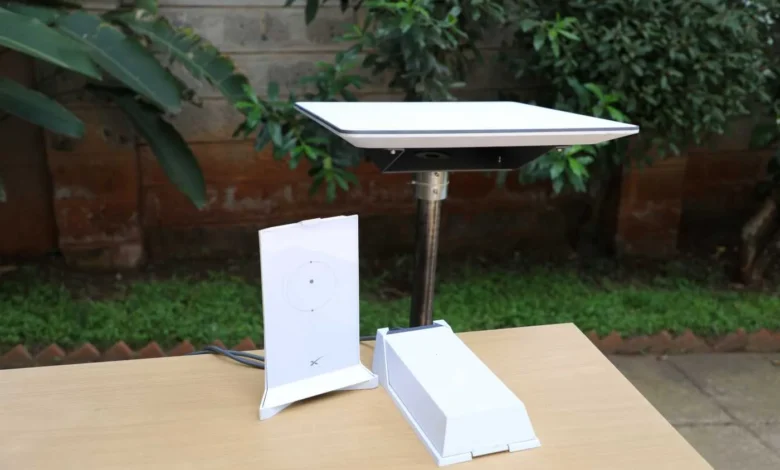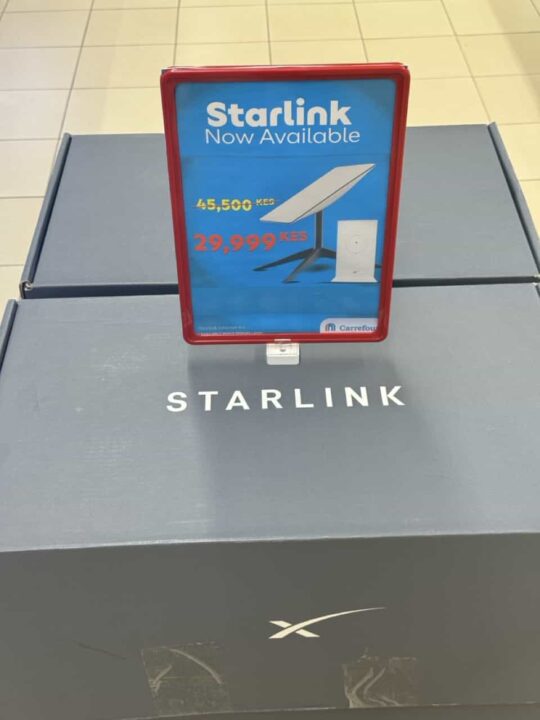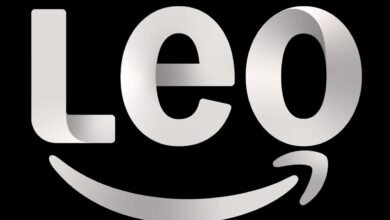
Starlink seems deeply committed to the Kenyan market. The hardware kits, essential for connecting to their high-speed satellite internet, are now readily available at major retailers like Carrefour and Naivas, priced attractively at just KES 29,999. This extensive availability through both online platforms like Jumia and offline stores, coupled with options for same-day delivery, democratizes access to reliable internet and challenges local telecom providers to innovate or risk becoming obsolete.
The service provider has gone all in with marketing across social media platforms for the price drop, and the KES 1300 data bundle for 50GB. This should mean one thing: the company has seen the potential for a serious shake up of the market, and they’re going all in.

Comparing Speeds and Prices with Local Telcos
In Kenya, the introduction of 5G by major telcos like Airtel and Safaricom promised a new era of internet speed and reliability. However, the reality has been underwhelming, with actual service offerings failing to meet expectations. Safaricom’s initial 5G routers were priced at a steep KES 25,000, later reduced to KES 10,000, yet the service has been plagued by old approaches to making money, stupidly slow speeds and restrictive data caps disguised as “unlimited” plans. Airtel, introduced their routers at KES 10,000 and dropped the price to KES 3,000, but still imposed speed limitations and data caps.
Starlink, on the other hand, offers speeds up to 200Mbps and if you don’t want the expensive standard monthly plan, you can hop on the genuinely competitive data bundle of KES 1,300 for 50GB, making the local telcos’ offerings appear insufficient and overpriced. This stark contrast is prompting a reevaluation of pricing strategies and service quality among local providers as Starlink gains traction.
Navigating Regulatory and Competitive Challenges
Starlink operates in a regulatory gray area compared to traditional telcos. It’s unclear how entities like the Communications Authority of Kenya can exert control over a satellite ISP that doesn’t fit neatly into existing regulatory frameworks. This could influence Starlink’s ability to adjust prices, which have already seen a significant drop from over KES 90,000 to just under KES 30,000 in less than a year.
This regulatory ambiguity could be either an advantage or a challenge for Starlink. However, it’s evident that local telcos need to enhance their offerings significantly. The simplicity of purchasing Starlink kits and the ease of integrating payments with local options like M-Pesa add layers of accessibility and convenience that challenge local ISPs, particularly in rural areas where traditional internet services fail to reach.
Despite its competitive edge, Starlink is not without challenges, particularly in customer service and local support. As a foreign entity, it may face difficulties in providing prompt and effective customer service, which could affect user satisfaction in the long term.
The Road Ahead
Starlink has the potential to further disrupt the Kenyan internet market by reducing kit prices and introducing tiered service packages that could attract a broader consumer base. The anticipated Starlink Mini and the transition to newer generations of hardware could revolutionize internet connectivity across the country.
Personally, I am considering purchasing the Gen 2 kit for my rural home, where traditional internet solutions like fiber and 5G routers have been impractical or inadequate. The high costs, poor speeds, and restrictive data caps have made these options unviable. Starlink’s strategy to provide internet from space is a game-changer for rural connectivity, and I am eager to be part of this revolution.
This proactive approach by Starlink should serve as a wake-up call for local telcos, forcing them to reevaluate their strategies and improve their services to compete in this rapidly evolving market landscape.






Your contact need quotation
Truthbetold, the data cap of 50GB/month plus the high cost of purchasing the starlink kit is a major hibdrance many kenyans especially those residing in rural areas. I am not yet boarding this bandwagon.
But as long as there are data caps, especially on the 1300 plan, the package still won’t attract many. Personally, I use a local provider, get 30Mbs speeds at only 2900 p/m. Good thing is that the data caps are 70GB per day, not monthly. There’s no way Starlink’s packages can attract me.